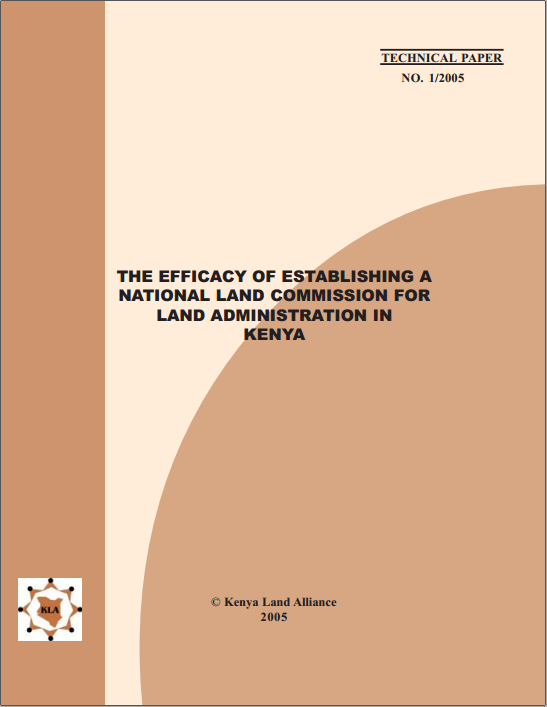The Kenya Land Alliance (KLA) is a not-for-profit and non-partisan umbrella network of Civil Society Organisations and Individuals committed to effective advocacy for the reform of policies and laws governing land in Kenya. KLA was founded in 1999 and registered as a Trust in 2001. The initiative to create an institutional framework for land laws and policy advocacy in Kenya was necessitated by the realization that the policy, legal and institutional framework created in 1950’s had become inadequate due to many changes in the social, political, economic and cultural fronts that had occurred in the country over the years.
The increased population has resulted in intense competition for access to land and natural resources. In addition, changes in the global environment brought about by globalization have combined to create a reality that is significantly different from the one existing when the
current framework was created in the 1950s. It is on this premise that KLA has been in the forefront in efforts towards effective advocacy for land laws and policy reforms in Kenya, as recently witnessed in the Presidential Commission of Inquiry into the Land Law System of
Kenya and the Constitution of Kenya Review Commission. Advocating for the formulation and implementation of a National Land Policy and review of land laws.
Our Vision
A society in which all people are assured of sustainable livelihoods through secure and equitable access and utilisation of land and natural resources.
Our Mission
To facilitate the activities of members by gathering and disseminating information towards an all-embracing, participatory and comprehensive land policy and law reforms in Kenya.
Members:
Resources
Displaying 51 - 55 of 76A Survey into the Management and use of Wetlands in Kenya
The Role Of Wetlands In Poverty Reduction- Extreme poverty among rural poor people living around wetlands remains a daily reality for more than 56% of Kenya’s population, who subsist on less than one dollar a day. Seventy percent of extremely poor households, a majority of who live in rural areas where hunger and poverty prevails, are now being caught up in a new web of lack of access to wetlands as safety-net during hard times due to appropriation of wetlands by private developers.
Kenya Land Alliance Fact Sheets 1-9 on human-wildlife conflicts in Kenya
A series of brief fact sheets on: background to human-wildlife conflicts in Kenya; legislative and administrative highlights; geographical areas that are prone to human-wildlife conflicts in Kenya; the role of communities in the management of biodiversity; main issues surrounding wildlife management and perpetuation of human-wildlife conflicts; current efforts at resolving human-wildlife conflicts; policy and legislative options for reform of the wildlife sector; best international practices for the management and conservation of wildlife, its habitats and biodiversity; the way forward in w
The National Land Policy in Kenya: Critical Public Land Issues and Policy Statements
Contains why the concept of public land must be incorporated in the National Land Policy; public land management; tenure of public land; administration of public land; acquisition of public land by foreigners; allocation and disposition of public land; the power of compulsory acquisition; public land and the indefeasibility of title; public land and land markets; land owned by statutory bodies; legislative framework. Each section contains a policy statement with suggestions as to what the National Land Policy should state.
The Efficacy of Establishing A National Land Commission for Land Administration in Kenya
Land administration has been described as the set of services that make the land tenure system within a country socially relevant and operational. This is through determining, recording and disseminating information about the tenure, value and use of land necessary for the implementation of land management policies
Land Update Newsletter Volume 3 Number 4
Includes a series of interviews on the theme, ‘How should the Ndungu Report recommendations be implemented? – what Kenyans say.’ Also includes some of the the Ndungu Report’s recommendations.




